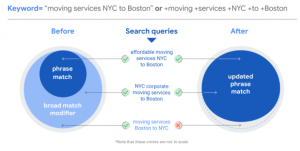1. Goodbye BMM
Google has decided to conclude offering Broad Match Modified (BBM). Google also announced that phrase match will take on new behavior which has been rolling out this month. Advertisers will have a few months to adjust before BBM is completely phased out in July.
There are many pros & cons with phrase match adapting & covering Broad Match Modified phrases. The idea is to simplify keyword management while also improving relevance for users. With this shift, however, phrase match’s net will expand the furthest it ever has. This will require advertisers to hone in on negative keywords as they monitor how this shifts their search results.

In this overlap, notice the phrase moving services Boston to NYC is the only phrase that does not serve. That is because the order of the phrase leads to a totally different meaning. A searcher is looking for NYC to Boston… not Boston to NYC.
While these changes start to occur, continue to watch & monitor your search queries & make changes accordingly. Reminder: this is a gradual rollout & Google will also be adapting the behavior along the way. If you are worried about losing access to the BBM phrases, you can always create them before the cut-off date!
2. BigPartnership
BigCommerce, an eCommerce SaaS solution, has recently partnered with Walmart. This move allows BigCommerce clients access to the Walmart Marketplace, a network with 120M unique monthly users. This partnership is a continuation of their quest to compete with Amazon, coming months after their Shopify partnership in June 2020.
It’s a win-win for both Walmart (who makes an average of 15% per referral each purchase) and BigCommerce clients (who can use the reach to push revenue for their products). While the profit margin on products sold will take a hit due to that percentage, this could be a great way to push additional revenue. If you want to test this platform, Walmart is offering to waive those fees for the first month if you fit certain criteria.
3. Google Search Console Adds “Associations” Feature
Near the end of February, Google announced a new feature that can be found in Google Search Console that allows site-owners to connect their Search Console account with various Google platforms. When implemented, Google Analytics, YouTube channels, Android apps and more can be connected to Search Console, providing a broader view of data across all platforms.
When connecting with Google Analytics as an association, users can look at Search Console data like organic search queries within Analytics. Furthermore, Search Console domain properties can be added, again providing a better range of data. Google Ads accounts can also be connected, as can a YouTube channel, the Play Console app (for App Indexing purposes), the Actions Console project and the user’s Chrome Web Store account.
According to Google, utilizing associations will give the site-owner access to a much wider range of critical data. Google has also suggested that this new feature will help to unlock more site functionality. While the wider range of data is a part of that, it remains to be seen what further potential this feature will bring to a site from a technical standpoint.
4. Google Now Including Domain Info in Search Results
A February update to Google’s search results has added a feature that allows users to access domain information. A new three-dot icon can be found in the upper right of most search results that the user can easily access to find this information. Once that icon is clicked, the information will populate in a pop-up card.

Although still in beta, these cards include not only a description of the domain and its security, but also the full URL of the selected search result and information on whether or not the result is an advertisement. Users can also quickly access their privacy settings and helpful information pertaining to how search works. Basically, the user can access all of the important information of a site in the search results without having to actually click on the link.

It’s important to keep in mind that all information Google pulls about domains comes directly from Wikipedia, so site owners’ hands are tied when it comes to optimizing the site to get these cards to trigger. This also means that smaller sites that don’t currently have Wikipedia entries will not be eligible for this new feature.
Google’s goal with these cards is to give users more context for each result, in turn helping them make more informed decisions while searching. That said, it’s still uncertain what a feature like this could do to traffic in the future. The update rolled out in mid-February and will be tweaked and reworked as Google learns how users interact with it.
Every week, the digital marketing analysts at Rocket Clicks round up the most interesting, exhilarating and dare we say controversial news to share with the team. We’ve collected the most notable PPC & SEO news in February to share with you here! Contributors to this post include PPC Analyst Pete Von Rueden and SEO Analyst Nick Sharafinski.



















